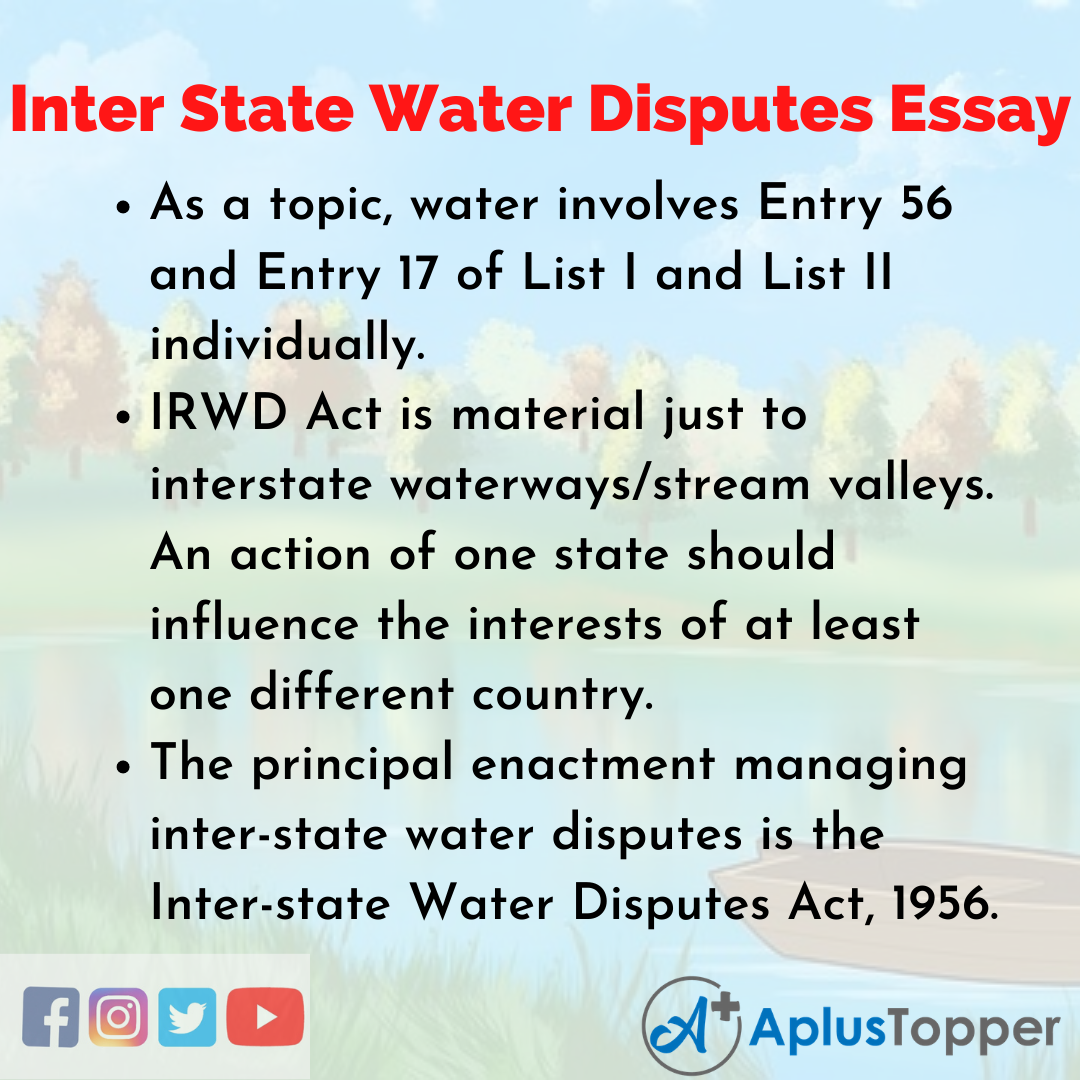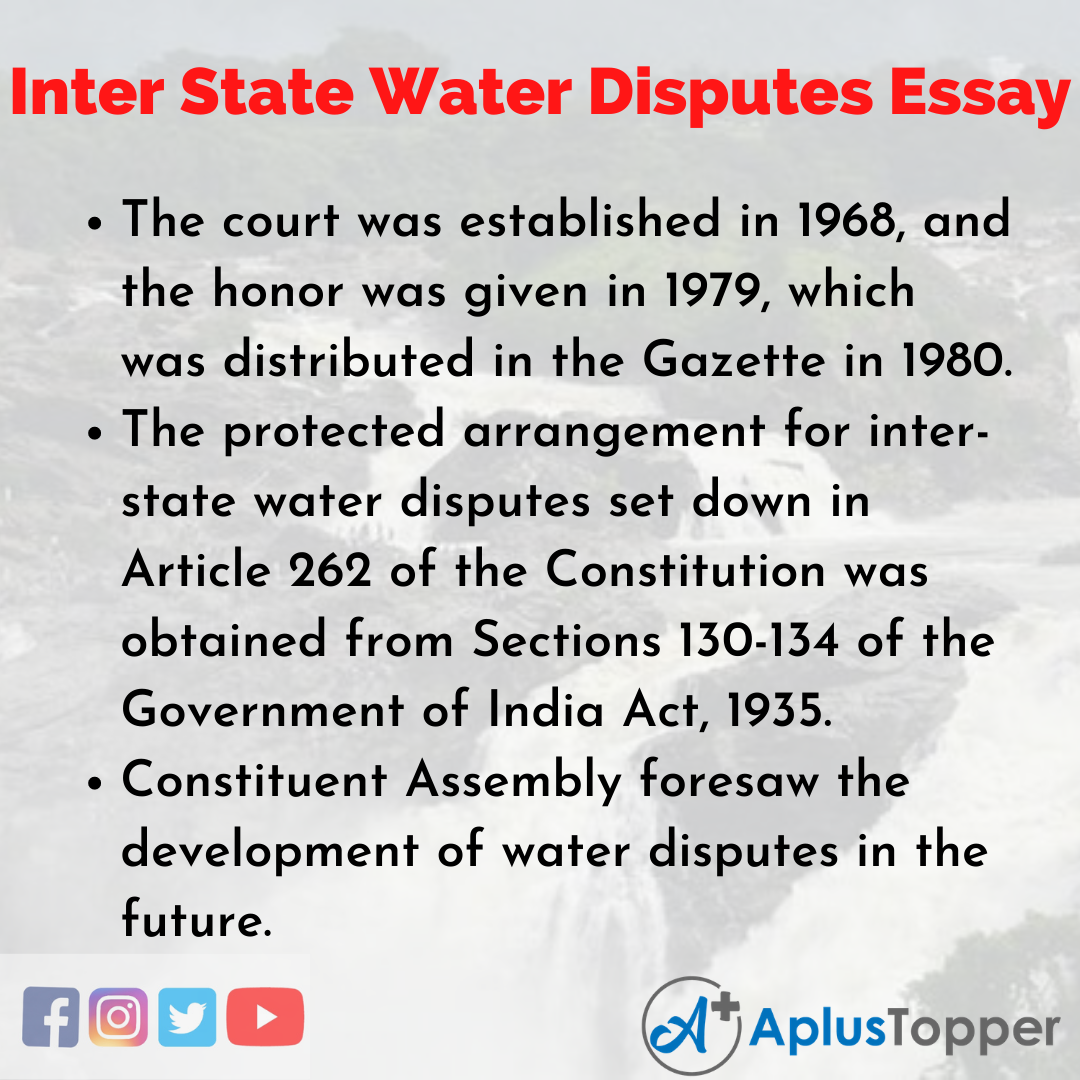Inter-State Water Disputes Essay: The Inter-State River Water Disputes are among the most adjacent issues in Indian federalism today. In extraordinary cases, it might hamper the connection between the various states. The ongoing instances of the Cauvery Water Dispute and the Satluj Yamuna Link Canal case are models.
Different Inter-State Water Disputes Tribunals have been compromised until this point, yet it had its issues. In this article, we break down whether it’s the ideal opportunity for another instrument. The protected arrangement for inter-state water disputes set down in Article 262 of the Constitution was obtained from Sections 130-134 of the Government of India Act, 1935.
You can also find more Essay Writing articles on events, persons, sports, technology and many more.
Long and Short Essays on Inter-State Water Disputes for Students and Kids in English
We are providing the students with essay samples on a long essay of 500 words and a short essay of 150 words on the topic of Inter-State Water Disputes.
Long Essay on Inter-State Water Disputes 500 Words in English
Long Essay on Inter State Water Disputes is usually given to classes 7, 8, 9, and 10.
According to section 17 of the State List, water is a State subject, and consequently, states are enabled to enact enactment on water. Constituent Assembly foresaw the development of water disputes in the future. A particular arrangement of Article 262 is referenced Constitution itself because of the affectability of such conflicts.
Parliament may by law accommodate the mediation of any question or grievance concerning the utilization, dispersion, or control of the waters of, or in, any inter-State waterway or stream valley. Despite anything in this Constitution, Parliament may, by law, give that neither the Supreme Court nor some other court will practice purview regarding any such debate or protest.
Accordingly, it very well may be seen that – the goal of the water question is represented by the Inter-State Water Disputes Act, 1956. As indicated by its arrangements, a state government can move toward the Center to allude the problem to a court, whose choice is viewed as last. Waterway water use/outfitting is remembered for state purview (section 17 of state list, Schedule 7 of Indian Constitution). Nonetheless, the association government can make laws on guidelines and improvement of inter-State waterways and stream valleys when practical in the public interest (section 56 of the association list, Schedule 7 of the Indian Constitution).
When public interest is served, the President may likewise build up an interstate chamber according to Article 263 to ask and suggest on the question that has emerged between the states of India. IRWD Act (section 2c2) approves the past arrangements (assuming any) among the bowl states to tackle an interstate waterway/stream valley. This act is kept to states of India and not relevant to association regions. Just concerned state governments are qualified to partake in the council arbitration, and non-government elements are not allowed.
Commonly there have been phenomenal deferrals in establishing the court. For instance, on account of the Godavari water contest, the solicitation was made in 1962. The court was established in 1968, and the honor was given in 1979, which was distributed in the Gazette in 1980. Additionally, in the Cauvery Water Dispute, Tamil Nadu Government mentioned comprising the council in 1970. Thoroughly after the intervention of the Supreme Court, the committee was established in 1990. Because of postponement in the court, state governments kept on putting assets in the development and alteration of dams, subsequently reinforcing their cases.
India has 2.4% of the World’s territory, 18% of the total populace; however, just 4% of the inexhaustible water asset. If promising advances are not taken, the lopsided water appropriation will build the chance of water clashes. Inter-state waterway water disputes upset our country’s helpful federalism and give a parochial attitude making regional issues better than public matters. One ought to understand that our country is a family wherein all states are its individuals.
So disputes must be settled by discourse and talks, and the political advantage must be kept away from it. The issue can be resolved by examining the contest in Inter-State Council, which can give a stage to the discussions. Such disputes must be settled ahead of schedule as conceivable to guarantee more prominent participation between the states.
Short Essay on Inter State Water Disputes 150 Words in English
Short Essay on Inter State Water Disputes is usually given to classes 1, 2, 3, 4, 5, and 6.
IRWD Act is material just to interstate waterways/stream valleys. An action of one state should influence the interests of at least one different country. At that point, just water debate is esteemed to have emerged under the IRWD Act (section 3). However, to our knowledge, it very well may be partitioned into two autonomous parts for lucidity reason in understanding the techno-lawful utilization of the IRWD Act. Moreover, Article 262 of the Constitution accommodates a particular law enacted by Parliament to arbitrate these disputes and excepting the ward, all things considered, including the Supreme Court, on the equivalent. Aside from this arrangement, water, as a topic, involves Entry 56 and Entry 17 of List I and List II individually.
Moreover, you can now access more Essay Writing on this topic and many more. While Entry 17 of List II gives the State Legislature select capacity to administer on water-related infrastructural ventures like water system, waste, stockpiling, and force; that force is dependent upon Entry 56 of List I, which gives the Parliament elite power despite anything in the Constitution, to enact on guideline and advancement of inter-state waterways and stream valleys as has been pronounced by law to be in the public interest. The principal enactment managing inter-state water disputes is the Inter-state Water Disputes Act, 1956.
10 Lines on Inter State Water Disputes in English
- As a topic, water involves Entry 56 and Entry 17 of List I and List II individually.
- IRWD Act is material just to interstate waterways/stream valleys. An action of one state should influence the interests of at least one different country.
- The principal enactment managing inter-state water disputes is the Inter-state Water Disputes Act, 1956.
- India has 2.4% of the World’s territory, 18% of the total populace; however, just 4% of the inexhaustible water asset.
- Parliament may by law accommodate the mediation of any question or grievance concerning the utilization, dispersion, or control of the waters of, or in, any inter-State waterway or stream valley.
- However, the Inter-State River Water Disputes are one of the most adjacent issues in Indian federalism today.
- The court was established in 1968, and the honor was given in 1979, which was distributed in the Gazette in 1980.
- The protected arrangement for inter-state water disputes set down in Article 262 of the Constitution was obtained from Sections 130-134 of the Government of India Act, 1935.
- Constituent Assembly foresaw the development of water disputes in the future.
- Inter-state waterway water disputes upset our country’s helpful federalism and give a parochial attitude making local issues better than public matters.
FAQ’s on Inter State Water Disputes Essay
Question 1.
What are Inter-State Water Disputes clarify with the model?
Answer:
They emerge because of uncertain issues concerning sharing the expenses and advantages of multi-reason ventures on these waterways. Instances of such disputes are (I) The Kaveri waterway water debate is among Tamil Nadu, Karnataka, Kerala, and Puducherry.
Question 2.
What number of Inter-State Water Dispute Tribunals are there?
Answer:
The Ministry of Water Resources records five continuous inter-state water disputes and councils on its site. While every one of these disputes began with its explanation, there are some primary reasons at the Center.
Question 3.
What is waterway water strife?
Answer:
Water struggle portrays a contention between nations, states, or gatherings over the rights to get to water assets. As freshwater is an indispensable yet unevenly dispersed characteristic investment, its accessibility frequently impacts a nation or area’s living and financial states.


